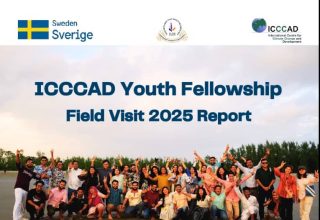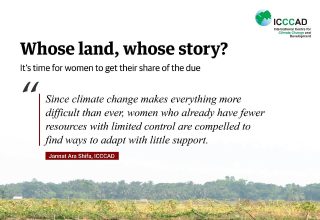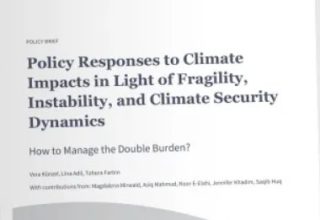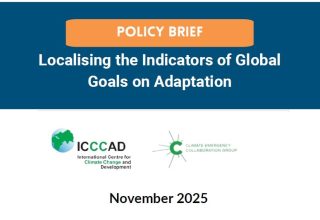Coastal farmers in Bangladesh are already adapting to the harsh realities of climate change, but without recognition, resources, or a voice in the decisions that shape their future

Salinity spreads quietly. One season, the paddy field turns pale. Next, the pond water tastes bitter. Over time, the soil hardens, tubewells dry up, and even the rain feels unreliable. In Bangladesh’s coastal polders, farmers now live with the constant anxiety of water—too much, too little, or too polluted.
Floods wash away young seedlings. Waterlogging chokes the land for weeks. When embankments break or sluice gates remain closed for too long, entire communities suffer. These are not just the results of natural disasters; they reflect broken systems, delays in decision-making, and infrastructure that too often fails those who depend on it most.
And yet, farming continues.
People adapt—again and again. Some grow vegetables on narrow strips of high land. Others raise fish in ponds or switch to saline-tolerant rice. Farmers share seeds with neighbours and test new cropping methods. A few manage to access training sessions, while many more learn from one another. These acts may seem small, but they are rich in knowledge, care, and resilience.
In these lands, climate adaptation is already underway. But the people driving it are rarely heard.
As COP30 approaches in Brazil, and as the outcomes of SB62 are still being processed, the biggest questions facing international climate negotiations are not just about finance—they are about recognition.
Who is leading adaptation on the ground?
Who is absorbing the cost of climate impacts?
And who is being excluded from decisions that directly affect their lives?
The struggle behind every harvest
In Khulna, Satkhira, Barguna, and across the coastal belt, farmers say it has become nearly impossible to plan their crops. Salinity creeps in. Rains arrive too early or too late. Drought leaves the soil cracked and uncertain. Land that once produced enough rice to feed a family now yields only half. Pest attacks are more frequent. Fresh water is harder to find.
Every planting decision carries a risk.
Will the rain come too late?
Will the canal water be too salty?
Will the price of inputs eat up the profit?
Behind each of these questions is the labour of people who rise early, work long hours, and shoulder both physical and emotional burdens. Men and women alike play essential roles in this work. But women do so while also cooking, caregiving, and managing the household. Their care work is unpaid, but it is vital.
Loss and damage are a daily experience
In climate negotiations, the term “loss and damage” refers to the irreversible effects of climate change. This includes both economic losses—such as ruined crops or damaged homes—and non-economic ones, such as displacement, cultural loss, and emotional distress.
For coastal farmers, loss and damage are not concepts. It is part of daily life.
When fields flood, families lose more than their income. They lose food security. They lose time spent on replanting. Some lose the energy to try again. Others take loans to survive the season, entering cycles of debt.
Women, in particular, often absorb this damage quietly. They reduce their meals, walk further for water, and put their own health last. These stories are rarely included in formal loss and damage assessments. But they should be.
What locally-led adaptation really needs
Bangladesh is a global advocate for locally-led adaptation (LLA). The idea is simple: people closest to the crisis should lead the solutions. But in practice, LLA still struggles to reach the ground.
Too many decisions are still made at the top. Local governments and NGOs often speak for communities without fully involving them. Farmers are invited to events, but not to planning tables. Women are asked to attend meetings, but not to lead them.
One farmer from Barguna, Abdul Awal, recently shared that capacity-building training is the first thing they need. He explained how frequent drought and unpredictable rainfall have damaged mung bean cultivation in his area. The rabi and aus seasons saw major losses. Without timely knowledge and adaptation support, farmers are left to shoulder the burden alone.
Another farmer, Gopal Chandra Das from Khulna, pointed out the urgent need for access to modern agricultural technologies. He said that many small farmers want to use improved tools and systems, but they either do not know how, or cannot afford to do so without support.
Their experiences reveal what is missing. For LLA to truly work, it must shift power. It must trust the people who are already adapting every day—and fund the systems they are building for themselves.
This means long-term training in climate-smart agriculture, not just short workshops. It also means creating virtual or hybrid platforms for knowledge exchange, so farmers from different regions can learn from one another. It means access to technology, but also to land and water rights. It means valuing traditional knowledge, not just importing new solutions. It means listening to both women and men farmers when designing programmes.
And it means making sure that adaptation finance reaches the last mile—not just the capital city.
What COP30 must deliver
At COP28, the Loss and Damage Fund was finally launched. That was a major achievement. But now, the world must decide how that money is spent. COP30 must go further. It must ensure that finance does not stay trapped in agencies and ministries. It must flow directly to farmers, especially those in high-risk areas.
Adaptation cannot be effective unless it is inclusive. That means gender justice. It also means challenging the power dynamics that keep smallholder farmers at the margins.
Coastal farmers are not asking for charity. They are asking for respect. They are asking to be included, not just consulted. They are asking for the tools to continue doing what they already do with strength and care.
Adaptation is already happening
If you walk through the polders today, you will see it. A patch of leafy vegetables growing beside a pond. A pile of cow dung is drying to be used as fertiliser. A homemade seed storage pot wrapped in old cloth. These are acts of adaptation. They are full of effort, knowledge, and quiet hope.
We need more than declarations. We need decisions that reflect the reality of people already adapting in silence. We need policies that are not only climate-smart but also farmer-wise.
Because the real work of resilience is already underway.
And the people behind it deserve to be seen.
Originally this article was published on July 01, 2025 at The Business Standard.
Jannat Ara Shifa is working as a Gender Analyst at International Centre for Climate Change and Development (ICCCAD). She can be reached at jannat.shifa@icccad.org.















